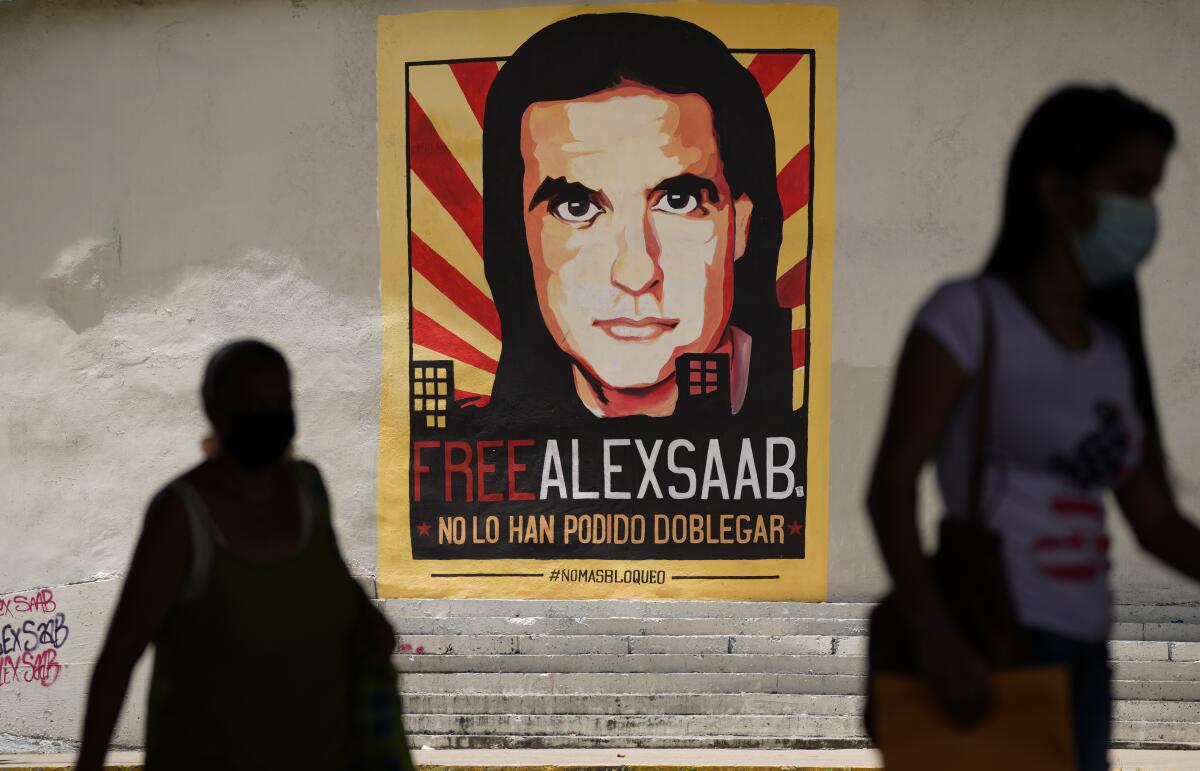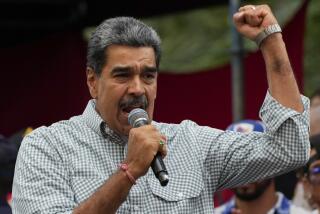Venezuela retaliates after Maduro ally is extradited to U.S.

MIAMI — Venezuela’s government said Saturday it would halt negotiations with the country’s opposition in retaliation for the extradition to the U.S. of a close ally of President Nicolás Maduro wanted on money-laundering charges.
Jorge Rodríguez, who has been heading the government’s delegation in talks that started in August, said his team wouldn’t travel to Mexico City for the next scheduled round of talks with his U.S.-backed opponents, although he stopped short of saying the government was abandoning the talks altogether.
The announcement came hours after businessman Alex Saab was put on a U.S.-bound plane in Cape Verde after failing in a 16-month fight to prevent his extradition to face money laundering charges in Miami. Saab was arrested in the African archipelago while making a stop on the way to Iran for what Maduro’s government later described as a diplomatic humanitarian mission.
Rodriguez, standing in front of a giant sign reading “Free Alex Saab,” called his arrest an illegal “aggression” by the U.S., which has been pushing for years for Maduro’s removal.
Adding to the intrigue, Venezuelan security forces on Saturday picked up six American oil executives who have been under home arrest in another politically charged case.
It’s unclear if the men — all of whom were convicted and sentenced last year to lengthy prison terms in a corruption case that the U.S. says was marred by irregularities — were being returned to jail. A lawyer for the men said he doesn’t know where they were being taken.
The so-called Citgo 6, for the Houston subsidiary of Venezuela’s state owned oil company, were lured to Caracas in 2017 for a meeting when masked police busted into a conference room and took them into custody on embezzlement charges tied to a never-executed deal to refinance billions in Citgo bonds.
Saab’s arrival in the U.S. is bound to complicate relations between Washington and Caracas. Maduro’s government has vehemently objected to Saab’s prosecution as a veiled attempt at regime change by Washington. U.S. prosecutors say Saab amassed a fortune wheeling and dealing on behalf of the socialist government, which faces heavy U.S. sanctions.
American authorities have been targeting Saab for years, believing he holds numerous secrets about how Maduro, the president’s family and his top aides siphoned off millions of dollars in government contracts for food and housing amid widespread hunger in oil-rich Venezuela.
However his defenders, including Maduro’s government as well as allies Russia and Cuba, consider his arrest illegal and maintain that Saab was a diplomatic envoy of the Venezuelan government and as such possesses immunity from prosecution while on official business.
In a statement Saturday, Venezuela’s government again denounced the “kidnapping” of Saab by the U.S. government “in complicity with authorities in Cape Verde.”
“The government of the Bolivarian Republic of Venezuela repudiates this grave violation of human rights against a Venezuelan citizen, invested as a diplomat and representative of our country before the world,” the statement said.
The argument failed to persuade Cape Verde’s Constitutional Court, which last month authorized his extradition after a year of wrangling by Saab’s legal team, which includes former Spanish judge Baltasar Garzón and BakerHostetler, one of the U.S.’ biggest firms.
Federal prosecutors in Miami indicted Saab in 2019 on money-laundering charges connected to an alleged bribery scheme that pocketed more than $350 million from a low-income housing project for the Venezuelan government.
Separately, Saab had been sanctioned by the previous Trump administration for allegedly utilizing a network of shell companies spanning the globe — in the United Arab Emirates, Turkey, Hong Kong, Panama, Colombia and Mexico — to hide huge profits from no-bid, overvalued food contracts obtained through bribes and kickbacks.
Some of Saab’s contracts were obtained by paying bribes to the adult children of Venezuelan first lady, Cilia Flores, the Trump administration alleged. Commonly known in Venezuela as “Los Chamos,” slang for “the kids,” the three men are also under investigation by prosecutors in Miami for allegedly forming part of a scheme to siphon $1.2 billion from Venezuela’s state-owned oil company, two people familiar with the U.S. investigation told the Associated Press.
But while in private U.S. officials have long described Saab as a front man for Maduro, he is not identified as such in court filings.
The previous Trump administration had made Saab’s extradition a top priority, at one point even sending a Navy warship to the African archipelago to keep an eye on the captive.
On Saturday. Colombian President Iván Duque lauded the extradition of Saab in a tweet, calling it a “triumph in the fight against drug trafficking, money laundering and corruption led by the dictatorship of Nicolás Maduro.”
However, the Biden administration has downplayed the importance of Saab’s problems, saying he can defend himself in U.S. courts and that his case shouldn’t affect ongoing negotiations sponsored by Norway aimed at overcoming Venezuela’s long running economic crisis and political tug of war.
The government last month appointed Saab to its negotiating team and fellow envoys arrived to Mexico carrying signs reading “Free Alex Saab.”
More to Read
Sign up for Essential California
The most important California stories and recommendations in your inbox every morning.
You may occasionally receive promotional content from the Los Angeles Times.










